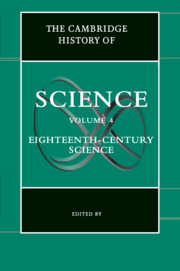Book contents
- Frontmatter
- 1 Introduction
- Part I Science and Society
- 2 The Legacy of the “Scientific Revolution”: Science and the Enlightenment
- 3 Science, the Universities, and other Public Spaces: Teaching Science in Europe and the Americas
- 4 Scientific Institutions and the Organization of Science
- 5 Science and Government
- 6 Exploring Natural Knowledge: Science and the Popular
- 7 The Image of the Man of Science
- 8 The Philosopher’s Beard: Women and Gender in Science
- 9 The Pursuit of the Prosopography of Science
- Part II Disciplines
- Part III Special Themes
- Part IV Non-Western Traditions
- Part V Ramifications and Impacts
- Index
- References
4 - Scientific Institutions and the Organization of Science
from Part I - Science and Society
Published online by Cambridge University Press: 28 March 2008
- Frontmatter
- 1 Introduction
- Part I Science and Society
- 2 The Legacy of the “Scientific Revolution”: Science and the Enlightenment
- 3 Science, the Universities, and other Public Spaces: Teaching Science in Europe and the Americas
- 4 Scientific Institutions and the Organization of Science
- 5 Science and Government
- 6 Exploring Natural Knowledge: Science and the Popular
- 7 The Image of the Man of Science
- 8 The Philosopher’s Beard: Women and Gender in Science
- 9 The Pursuit of the Prosopography of Science
- Part II Disciplines
- Part III Special Themes
- Part IV Non-Western Traditions
- Part V Ramifications and Impacts
- Index
- References
Summary
The eighteenth century represents a distinct era in the organizational and institutional history of European science. Growing out of an “organizational revolution” that accompanied the intellectual transformations of science in the sixteenth and seventeenth centuries, the scientific enterprise became newly solidified in the eighteenth century. Indicative of this solidification, European governments increasingly supported and structured novel social and institutional forms for eighteenth-century science. Governments moved to support science for the perceived usefulness of expert knowledge of nature.
Science reorganized in the eighteenth century centered on national academies of science modeled after the Royal Society of London (1662) and the French Académie Royale des Sciences (1666). It also involved observatories, botanical gardens, and new forms of publication and scientific communication. This characteristic Old-Regime style of organized and institutionalized science matured over the course of the eighteenth century and was replaced in the nineteenth century by an equally distinct form for organized science that came to involve specialized societies, disciplinary journals, and a revived university system.
- Type
- Chapter
- Information
- The Cambridge History of Science , pp. 87 - 106Publisher: Cambridge University PressPrint publication year: 2003
References
- 8
- Cited by



